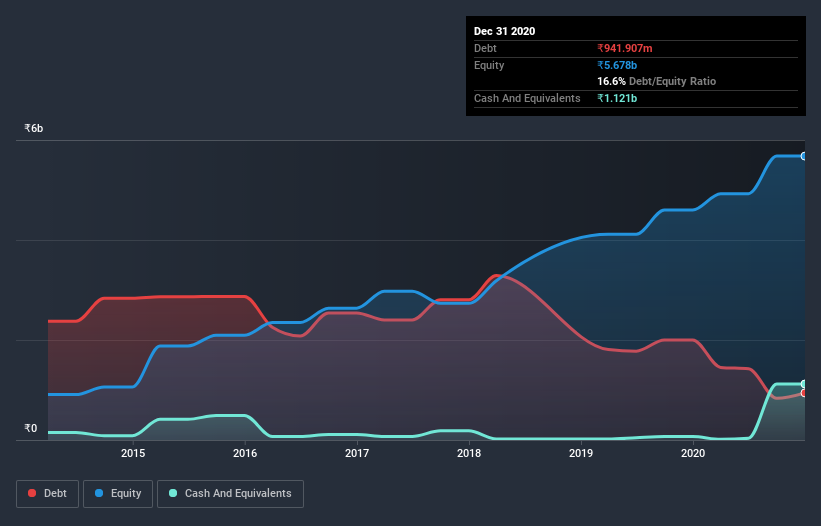These 4 Measures Indicate That Lux Industries (NSE:LUXIND) Is Using Debt Safely
Legendary fund manager Li Lu (who Charlie Munger backed) once said, 'The biggest investment risk is not the volatility of prices, but whether you will suffer a permanent loss of capital.' It's only natural to consider a company's balance sheet when you examine how risky it is, since debt is often involved when a business collapses. We can see that Lux Industries Limited (NSE:LUXIND) does use debt in its business. But should shareholders be worried about its use of debt?
When Is Debt Dangerous?
Debt assists a business until the business has trouble paying it off, either with new capital or with free cash flow. In the worst case scenario, a company can go bankrupt if it cannot pay its creditors. However, a more frequent (but still costly) occurrence is where a company must issue shares at bargain-basement prices, permanently diluting shareholders, just to shore up its balance sheet. Of course, plenty of companies use debt to fund growth, without any negative consequences. When we examine debt levels, we first consider both cash and debt levels, together.
Check out our latest analysis for Lux Industries
What Is Lux Industries's Net Debt?
You can click the graphic below for the historical numbers, but it shows that Lux Industries had ₹824.5m of debt in September 2020, down from ₹2.00b, one year before. However, its balance sheet shows it holds ₹1.12b in cash, so it actually has ₹296.2m net cash.

How Strong Is Lux Industries' Balance Sheet?
The latest balance sheet data shows that Lux Industries had liabilities of ₹3.07b due within a year, and liabilities of ₹311.5m falling due after that. Offsetting this, it had ₹1.12b in cash and ₹2.91b in receivables that were due within 12 months. So it actually has ₹653.6m more liquid assets than total liabilities.
Having regard to Lux Industries' size, it seems that its liquid assets are well balanced with its total liabilities. So while it's hard to imagine that the ₹45.1b company is struggling for cash, we still think it's worth monitoring its balance sheet. Succinctly put, Lux Industries boasts net cash, so it's fair to say it does not have a heavy debt load!
Another good sign is that Lux Industries has been able to increase its EBIT by 22% in twelve months, making it easier to pay down debt. When analysing debt levels, the balance sheet is the obvious place to start. But you can't view debt in total isolation; since Lux Industries will need earnings to service that debt. So when considering debt, it's definitely worth looking at the earnings trend. Click here for an interactive snapshot.
But our final consideration is also important, because a company cannot pay debt with paper profits; it needs cold hard cash. While Lux Industries has net cash on its balance sheet, it's still worth taking a look at its ability to convert earnings before interest and tax (EBIT) to free cash flow, to help us understand how quickly it is building (or eroding) that cash balance. Over the last three years, Lux Industries recorded free cash flow worth a fulsome 88% of its EBIT, which is stronger than we'd usually expect. That puts it in a very strong position to pay down debt.
Summing up
While we empathize with investors who find debt concerning, you should keep in mind that Lux Industries has net cash of ₹296.2m, as well as more liquid assets than liabilities. The cherry on top was that in converted 88% of that EBIT to free cash flow, bringing in ₹2.6b. So is Lux Industries's debt a risk? It doesn't seem so to us. When analysing debt levels, the balance sheet is the obvious place to start. However, not all investment risk resides within the balance sheet - far from it. We've identified 1 warning sign with Lux Industries , and understanding them should be part of your investment process.
If, after all that, you're more interested in a fast growing company with a rock-solid balance sheet, then check out our list of net cash growth stocks without delay.
If you decide to trade Lux Industries, use the lowest-cost* platform that is rated #1 Overall by Barron’s, Interactive Brokers. Trade stocks, options, futures, forex, bonds and funds on 135 markets, all from a single integrated account. Promoted
New: AI Stock Screener & Alerts
Our new AI Stock Screener scans the market every day to uncover opportunities.
• Dividend Powerhouses (3%+ Yield)
• Undervalued Small Caps with Insider Buying
• High growth Tech and AI Companies
Or build your own from over 50 metrics.
This article by Simply Wall St is general in nature. It does not constitute a recommendation to buy or sell any stock, and does not take account of your objectives, or your financial situation. We aim to bring you long-term focused analysis driven by fundamental data. Note that our analysis may not factor in the latest price-sensitive company announcements or qualitative material. Simply Wall St has no position in any stocks mentioned.
*Interactive Brokers Rated Lowest Cost Broker by StockBrokers.com Annual Online Review 2020
Have feedback on this article? Concerned about the content? Get in touch with us directly. Alternatively, email editorial-team (at) simplywallst.com.
About NSEI:LUXIND
Excellent balance sheet with reasonable growth potential.
Similar Companies
Market Insights
Community Narratives



